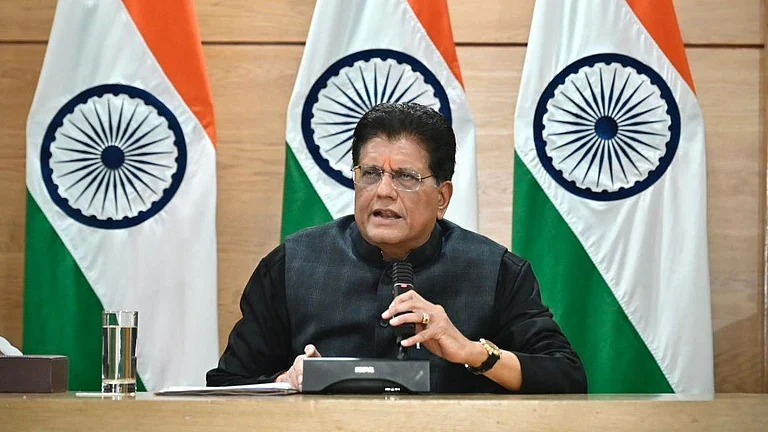
Piyush Goyal’s Qatar Visit Marks Push to Seal India–Qatar FTA by 2026
With US Trade Talks Stalled, India Looks to Deepen Ties with Qatar
India–Qatar Trade: Energy Dominates, but FTA Aims to Broaden the Partnership
As Global Trade Uncertainty Soars, India and Qatar Seek Stable Economic Ground
India Eyes Mid-2026 Deadline for Qatar FTA amid Global Trade Realignments
Minister of Commerce and Industry Piyush Goyal concluded his two-day official visit to Qatar on October 7, where he co-chaired the Qatar-India Joint Commission Meeting in Doha.
Goyal’s first visit to Doha comes at a time when New Delhi continues to grapple with the fallout of its stalled trade talks with Washington, which led to the Donald Trump administration imposing 50% duties on most Indian goods. Against this backdrop, the visit underlines the strategic importance India places on strengthening trade and investment relations with Qatar.
Qatar is one of India's key trading partners in the Gulf Cooperation Council (GCC), with bilateral trade estimated at over $14bn in 2024-25. Goyal announced on Monday that the India-Qatar free trade agreement (FTA)—officially termed the Comprehensive Economic Partnership Agreement (CEPA)—is likely to be concluded by the middle or third quarter of next year. The Terms of Reference (ToR) for the pact are expected to be formalised soon.
India–Qatar Trade Snapshot
The bilateral trade between India and Qatar stood at $14.15bn in FY25. India’s exports to Qatar were valued at $1.68bn, while imports surged to $12.46bn, resulting in a trade deficit of $10.78bn.
Energy dominates the trade relationship, with petroleum crude and gas products accounting for nearly 90% of India’s total imports from Qatar—worth around $11.08bn, or 88.9% of total imports.
On the other hand, India’s exports of $1.68bn to Qatar reflected mixed trends across sectors, including iron and steel products, rice, gold and precious metal jewellery.
The Case for Closer Ties
The global economy is currently navigating heightened volatility driven by regional conflicts and rising trade policy uncertainty. Increasingly, such uncertainty is being deployed as a deliberate strategy, with countries recalibrating trade rules to address domestic pressures or gain leverage in negotiations.
For decades, multilateral and regional trade frameworks have helped ensure stability, limiting uncertainty to episodic disruptions such as Brexit, the COVID-19 pandemic, or US–China trade tensions. However, in 2025, amid weakened global trade rules and intensifying competition for critical raw materials, uncertainty has surged to record levels.
According to UN Trade and Development's (UNCTAD) last five year data, global trade policy uncertainty reached a record high in June this year, with its index soaring to 2,799 compared with 187 a year earlier.
"The evolving India–Qatar partnership reflects a pragmatic convergence of needs—Qatar’s quest for diversified security and investment partners and India’s pursuit of stable energy supplies and regional influence," said Ajay Srivastava, founder of New Delhi-based think tank Global Trade Research Initiative (GTRI).
Indian exports to the United States are currently subject to a 25% “penalty” due to New Delhi’s continued energy ties with Russia. India is now the world’s second-largest importer of Russian crude oil.
Beyond trade, India has strategic reasons to deepen engagement with Qatar. GTRI noted that Qatar’s position in the Persian Gulf gives it influence over vital maritime routes underpinning India’s import flows.
Moreover, Qatar remains among India’s top suppliers of liquefied natural gas (LNG) and liquefied petroleum gas (LPG), both crucial for sustaining industrial activity and urban energy demand.
GTRI also observed that, following Israeli airstrikes in Doha on 9 September—which exposed the limitations of US security guarantees—Qatar has begun recalibrating its foreign policy to diversify beyond traditional Western alliances. President Donald Trump has issued an executive order in which the US pledged to guarantee Qatar’s security, but the true scope of the pledge will be seen in real time.
"Strengthening ties with India—an emerging global power with growing economic and defence capabilities—offers Qatar a stable partner in Asia, potential technology and investment collaboration, and a voice in a multipolar world less dependent on the US," Srivastava added.


































